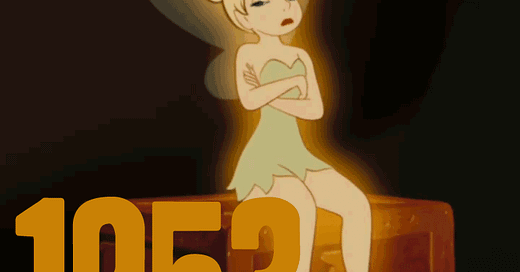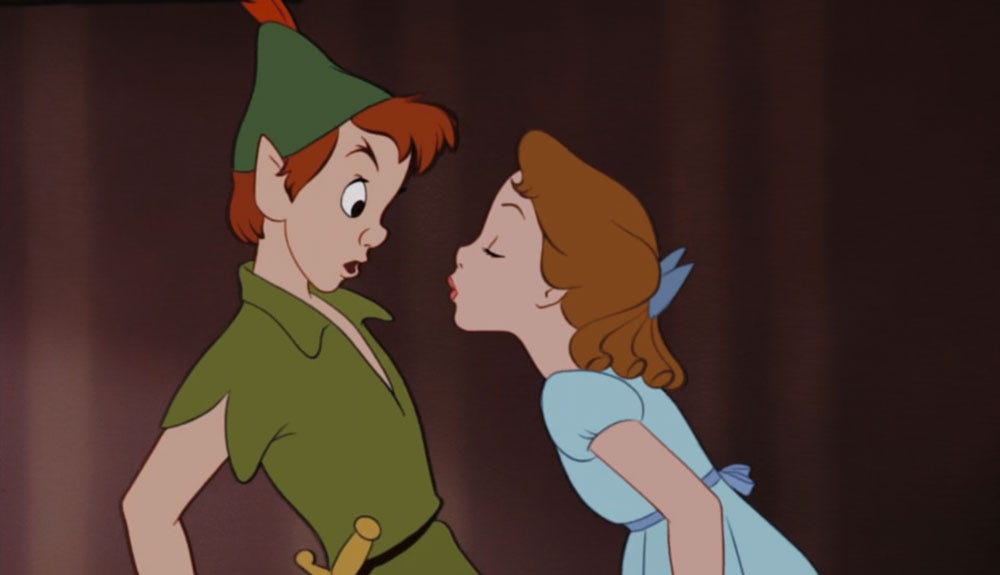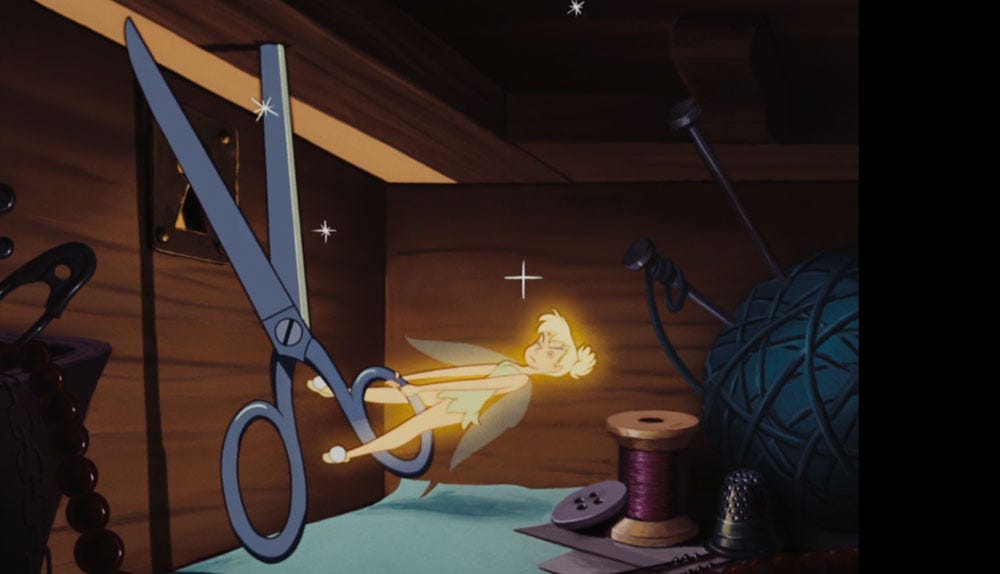GROSS/44 1953 - Peter Pan: a timeless classic and a morbid incel fantasy
Which would be worse: never growing up or living forever?
Gross is every year’s top-grossing movie, since 1913, reviewed.
PETER PAN, directors HAMILTON LUSKE, CLYDE GERONIMI, WILFRED JACKSON, based on a play by J. M. BARRIE, voices BOBBY DRISCOLL, KATHRYN BEAUMONT, HANS CONRIED, production company WALT DISNEY PRODUCTIONS, released 1953, 77 MINUTES.
Peter Pan - in all of its many versions and certainly in this one - is a complicated and cruel logical puzzle, a set of interlocking and contradictory elements. A boy we know will remain a child, a girl we know is about to grow up, a gang of abducted children who may not grow up even if they want to. A nasty fairy, neither child nor adult. The fairy and the girl are both in love with the boy but he is uncomprehending, sexually and emotionally neuter. It’s a fairytale coming-of-age love triangle, only with the bizarre twist that one or more of our lovers will never actually come of age, never attain majority at all.
Disney, as you’d expect, aims to empty this awkward narrative of its unsettling late-Victorian tensions - the tricky apparatus of (mainly) English-language children’s literature in the ‘classic’ period. This, of course, is Disney’s job, in the golden age. To take brutal stories about succession, forced marriage, cannibalism and so on from the forests of old Europe and dark, oddly sexual stories about dead children from the tall, Georgian houses of London and sanitise them. Make them palatable for an audience that probably drove to the movie theatre in a new Ford but also fears death.
Peter Pan belongs to the latter part of the period that gave us a string of publishing phenomena in a new and expanding genre: children’s literature. These late 19th century books contained modern stories about bourgeois kids experiencing - and transcending - crisis or loss. Alice, those railway children, the Water-Babies (in the United States the stories inevitably had a more frontier vibe). The mid-20th century extension of this category would bring more of these rosy-cheeked, governess-raised kids: Christopher Robin, the Walkers and the peculiar Pevensies (also Hobbits, of course, who never grow up and live to 130).
In the movie, Tinker Bell (the fairy) and Wendy (the girl) compete for Peter’s affection as if in a melodrama by Sirk or Wyler. Peter’s obliviousness to their campaigning (“w-w-w-what’s a kiss?”), even to Tinker Bell’s genuinely aggressive competitive behaviour, is straight from a weepie of the period. Close your eyes and Peter is one of those unworldly Professor types who smokes his pipe and dreams while Greer Garson fusses around him, failing to hide her frantic longing for the tweedy idiot.
To stop time
But the central oddity here is not the female characters’ implausible longing for literal man-child Peter Pan. It’s the fantasy of never growing up. It sounds superficially reasonable as a plot device - like something from one of the many age-paradox movies: Big, Benjamin Button, Freaky Friday - until you realise that no child ever wished to stay a child, no child ever yearned for the indefinite infancy offered by J.M. Barrie. Children are in a hurry to grow up, to escape the playroom, enter the world. Peter Pan is an adult fantasy of childhood. Children in this fantasy give us, the adults in the audience, access to what is lost, what is now definitively beyond reach.
Barrie’s fantasy of an eternal minority is chilling, a foreclosure of everything childhood would prepare you for, a literal infantilisation. The more I think about it the more horrifying it is. A morbid sealing off of experience - permanent confinement to the playroom. It’s essentially an incel’s dream but also somehow a potent enough idea that it’s been rewritten and reworked in every medium hundreds of times. Barrie himself permitted its use by dozens of other artists and authors. There are half a dozen Disney sequels and spin-offs and Peter shows up in the theme parks, of course. A constant stream of new, ageless Peter Pans.
In her book about Peter Pan, Jacqueline Rose makes a good case that children’s literature is not really for children, or at least that it essentially, inescapably expresses adult fantasies about what childhood is and that in these stories children are asked to identify with characters who are not - could not be - children, but children imagined by adults, adults who have passed through the one-way door to adulthood. Rose says they allow us grown-ups to return to “…a primitive or lost state to which the child has special access. The child is, if you like, something of a pioneer who restores these worlds to us, and gives them back to us with a facility or directness which ensures that our own relationship to them is, finally, safe.”
It’s a hall of mirrors - the adult author fantasises a child, the child reader experiences this fantasy by reconstructing the adult’s fantasy, often via the intermediary fantasy of an adult parent.
Some credit
I don’t want to be glib or tendentious here. Peter Pan is beautifuly animated. It sits somewhere near Disney’s peak: cell animation that’s never been improved on (this is the last movie on which all nine of Disney’s most important artists were able to work). The script is witty, the action fast-paced, vertiginous. Oliver Wallace’s music is polished - and tightly optimised for the animated form in a way that we now take for granted but was still evolving in the fifties.
But Peter Pan is hard work. There’s an inexplicably nasty ‘red Indian’ sequence that’s painful to watch and achingly long - your thumb will hover over ffw. It’s a puzzling solecism, even for its day (worse, substantially, than the Minnie Ha-Has and ‘friendly Indians’ of the silent era). What’s chilling is that Walt Disney did this time and again and was condemned for it every time. Seven years before this, in 1946, Song of the South was boycotted nationwide by civil rights groups and the film was soon disappeared all together by the studio. Somehow nothing had been learnt in the intervening years, though. The version that’s on Disney+ carries the now-standard pre-roll warning:
Welcome to my world
This is GROSS. I don’t need to remind you we’re slogging year by year through the bleak, conservative 1950s right now. It won’t get much better for years (although I’ve found a loophole and inserted another incel classic, Hitchcock’s Rear Window, for 1954).
The Disney classics - the handful of genuine masterpieces from this era - are landmarks in movie culture - works of art. But they’re somehow also - and more often than I think I’d expected - dark and claustrophobic things. I wish I understood the variety of hypnosis employed by the Disney Corporation here. It’s effective, though. Across the decades we’ve been convinced Walt’s domain is an uncomplicated, sun-filled landscape when, in fact, it’s a neurotic, windowless undercroft. A place of unresolved tensions, emotional damage and uncertainty. We don’t know how to reckon with this so we block it out and think only about that pointy-towered castle and the singing Princesses and the talking duck.
GROSS is free. There’s no paywall. Nothing to pay. But if you like this stuff, you’re welcome to support the project. And if you click this button you’ll get it for half price - £2/month instead of £4 and £20/year instead of £40.
I know you’ll agree with me when I say it’s the coming to an end - the finitude - that gives life meaning and that childhood - no matter how filled with joy and play - is really preparation for the downhill segment of life, the segment during which we learn everything of importance and fuck everything up.
Jacqueline Rose also says: “Peter Pan is peculiar, and yet not peculiar, in so far as it recapitulates a whole history of children's fiction which has not yet come to an end. My objective in exposing the difficulties of its history will be to make some contribution to the dismantling of what I see as the ongoing sexual and political mystification of the child.”
Michael Jackson called his own involuted theme park Neverland Ranch.
Disney’s ‘Cinderella’ castle, which is supposed to be magical, is modelled on the homes of various atavistic European aristocrats. It can’t fail to send a shiver down the spine of anyone who knows what’s actually been going on in European castles in the last few hundred years.
I use two lists of top-grossing movies for this project. They disagree about 1954’s biggest hit, though, so I’m using my discretion to write about Rear Window next, instead of White Christmas - although I think it’s actually pretty unlikely that the Hitchcock was bigger than Bing.








Peter Pan is the exact opposite of an incel fantasy. It's more like an incel nightmare where a boy can never achieve sexual maturity. Since Peter Pan also keeps losing his memory (like when he permanently forgets about Tinkerbell soon after she dies), you can't even say he's actively choosing this prepubescent eternity since he essentially can only live in the present. Maybe you can say Peter Pan is something of a MGTOW fantasy since Peter Pan is free from ever having to worry about appealing to girls or women.